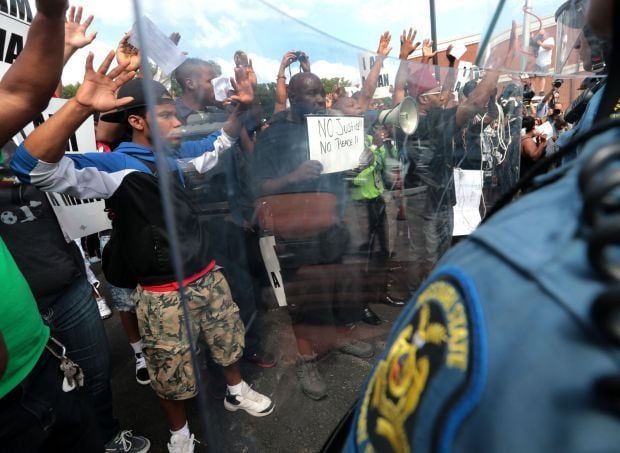My Ferguson moment happened at church.
It was about two weeks after Aug. 9, 2014, the day Michael BrownŌĆÖs dead body was left in the street for hours after he had been shot by a police officer.
I was standing next to my wife in the second or third row. We were singing a popular Christian hymn I had sung dozens of times before. When the chorus rolled around the second time, I couldnŌĆÖt get out the words. I couldnŌĆÖt hold back the tears. Flooded with emotions that had been welling up for several days, I cried and shook, like I was at a funeral for a loved one who had unexpectedly passed.
I donŌĆÖt know why I broke down at that song, at that moment. It might have been the exhaustion of writing of my life for two weeks. It might have been the overwhelming emotion of my visit a few days earlier to West Florissant Avenue and Canfield Drive in Ferguson to experience the protests up close.
People are also reading…
Was I angry at God? Were my eyes opened to the historic racism that had been baked into the structure and daily life of ├█č┐┤½├Į? Was I feeling helpless because all I could do was put words on paper, hoping they made a difference as a historic civil rights uprising unfolded?
I still donŌĆÖt know why that moment unfolded the way it did. But it was the moment I knew IŌĆÖd be writing about Ferguson for the rest of my life.

Cynthia Barnett of north ├█č┐┤½├Į County performs her song ŌĆ£I SurrenderŌĆØ as she goes live on her Facebook page on Thursday, Aug. 8, 2024, on Canfield Drive, now home to the Renewal Heights Apartments. ŌĆ£The spirit told me to come out and do it today,ŌĆØ Barnett said. Inside: Tony Messenger reflects on the legacy of the events of a decade ago. A2
For the past decade, much of my work has been focused on telling the stories of those who have experienced the underbelly of institutional racism in ├█č┐┤½├Į and the forces of good working to make this a more equitable community.
There was Keilee Fant, who became the poster child of the movement to end debtorsŌĆÖ prisons in ├█č┐┤½├Į, where mostly poor Black residents in cash-strapped municipalities were fined repeatedly for driving and other infractions. They were jailed when they couldnŌĆÖt afford to pay for their freedom.
There were the Medicaid 23, Black pastors from across the state who were arrested and charged with trespassing when they dared to sing, pray and chant during a Missouri Senate debate. They were highlighting the stateŌĆÖs failure to expand Medicaid and provide health care to more poor people.
There was Jason Wilson, the Clayton coffee shop owner who was stopped by police for ŌĆ£canvassing while BlackŌĆØ ŌĆö he was knocking on doors on his way to becoming the first Black man elected to the Clayton School Board.
There were Luthor Hall and Milton Green, two Black police officers who felt abandoned by their colleagues in the ├█č┐┤½├Į Metropolitan Police Department, with careers cut short. Hall was beaten up by white colleagues while working undercover during a protest; Green, while off duty, was shot by a white colleague and is still pursuing justice in federal court.
These stories were not tied directly to BrownŌĆÖs death, but they had everything to do with the causes of one of the most sustained periods of protest in our nationŌĆÖs history. What Ferguson did was rip off the Band-Aid covering a regionŌĆÖs original sin and reveal racism and division that could be ignored no more.
The words of the Rev. Martin Luther King Jr., in his ŌĆ£,ŌĆØ have guided me over these 10 years as I use my platform to tell stories of oppression.
ŌĆ£First, I must confess that over the last few years I have been gravely disappointed with the white moderate,ŌĆØ King wrote, lamenting that the ŌĆ£white moderateŌĆØ is often more devoted to order than justice, thinking they can set a timetable for when and how protests should occur.
ŌĆ£Shallow understanding from people of good will is more frustrating than absolute misunderstanding from people of ill will,ŌĆØ King wrote. ŌĆ£Lukewarm acceptance is much more bewildering than outright rejection.ŌĆØ
There is no timetable for justice. But in the past 10 years, there has been tangible progress locally in terms of racial equity, from gained Black political power, to increased accountability in policing, to a stronger focus on investing in communities that have been left behind.
ŌĆ£IŌĆÖm more hopeful than I was 10 years ago,ŌĆØ says Jason Purnell, president of the James S. McDonnell Foundation.
Months before Brown was killed, Purnell released the landmark ŌĆ£For the Sake of AllŌĆØ report, highlighting health disparities among Black and white residents in the ├█č┐┤½├Į region. One of the values of the Ferguson protests, Purnell says now, is the massive gain in comprehension of racial disparities and how theyŌĆÖve persisted for decades.
ŌĆ£WeŌĆÖre not going to go back,ŌĆØ Purnell says. ŌĆ£WeŌĆÖre not going to go back to, ŌĆśI didnŌĆÖt know.ŌĆÖŌĆØ
On that day in church 10 years ago, I knew. I knew that Ferguson had changed the ├█č┐┤½├Į area forever, as so many of us opened our eyes to the injustices around us. I could wipe away my tears, but I could not turn away.

ŌĆ£Too bad he had to be dead to be a celebrity,ŌĆØ said a man who declined to be identified on Thursday, Aug. 8, 2024, as he recorded video while driving past a memorial to Michael Brown at the spot he was killed by a police officer 10 years ago in Ferguson.
After Darren Wilson shot Michael Brown on Aug. 9, 2014, the protests, fueled by social media, continued for weeks and spread across the countr…





















